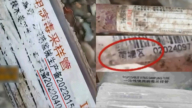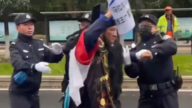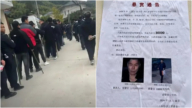【新唐人2012年1月21日讯】1月18号浙江高级人民法院宣布,维持对“亿万富姐”吴英的死刑判决。案件一宣判,立即引起司法不公的争议,大批民众反应吴英“罪不至死”,呼吁最高院慎重复核死刑。很多民众认为判处吴英死刑,是地方官员想杀人灭口。
吴英的辩护律师张雁峰认为,吴英只是民间借贷,没有构成集资诈骗犯罪的3大主要认定条件。
首先,吴英没有采用诈骗的手段集资,而是借钱做生意;其次,她没有非法占有集资款的目地,没有转移、隐匿、销毁账簿或逃跑的行为﹔此外,她也没有向社会公众非法集资,集资对像只有特定的十多人。
大陆诗人和文化评论家叶匡政认为,吴英的案子没有受害人,不构成诈骗案,她只是向11个金融掮客借钱,而这些人本来就是以借贷资金为生的。判吴英死刑,是地方官想杀人灭口。
有网民质疑,相比近年来查处的贪官动辄贪污数十亿元却少有被判死刑,官与民的违法成本为何如此悬殊?
北京宪政学者陈永苗表示,49年共产党执政后,为了垄断金融领域,制造了一整套的法律、法规限制民间的金融活动,现在民众的反应也是对这种垄断的宣战。
陈永苗:“她没办法从银行融资,因为中国有一个基本规定,对民营企业有一个非常苛刻的歧视的问题,判死刑也是49年以来,中国存在的对民间金融活动的一种歧视,就是如果是官方的话,他就不判死刑,民间出现这种活动他就要判死刑。所以我觉得很多人呼吁免吴英死刑,也是对官方这种垄断制度的反抗。”
吴英在看守所内曾举报检举了17名地方官员和银行负责人。
另有媒体报导,吴英被关期间,曾有浙江省东阳市十多名官员联名请求浙江高院,维持一审对于吴英的死刑判决。
陈永苗:“它这个罪犯,不仅仅是吴英的金融诈骗,也应该存在这背后巨大的腐败,很多很多的资金实际上变成官员所有了,官员也参与了这个诈骗的过程里面,这个都没有呈现出来,所以官员非常急迫的把吴英判处死刑。”
中共喉舌《人民日报》在海外的子报《环球时报》报导声称:媒体如果自诩民意代表,对最高院复核吴英案发出所谓“呼吁”,则有干扰司法之嫌。
叶匡政:“吴英这个案一判决以后,在微博上可以看到,民众99%都是一边倒的,就是站在吴英这一边,环球时报就是,凡是民众赞成的,或者民众认为正确的,它通常是唱反调的。 影响力很大的案件,媒体通过采访了解民意,应该说整个这种民意场,包括媒体的这种反应,应该尊重。”
据《财新网》报导,浙江高院内部对于吴英案件,不仅存在着量刑轻重的较大争议,即便是罪名本身、案件性质,吴英到底是构成集资诈骗罪、非法吸收存款罪,还是仅仅是一种民间借贷引发的民事案件,都存在很大的争议。
北京律师李庄在他的微博中写道:昨晚我在四网站发了对吴英要刀下留人帖子,引发上千网民讨论,奇怪,只有6名异议,99.4%要求留命,耐人寻味的是,未见一个非法集资受害人出来。所以,一个判决的好坏,要考虑社会公众的接受度。
新唐人记者刘惠、李若琳采访报导。
——————-
Young Tycoon’s Death Penalty Triggers Public Debate
On Jan.18, Zhejiang People’s High Court announced
death penalty to billionaire Wu Ying.
The verdict immediately aroused public controversy,
arguing that her sentence reflects the judicature is unfair.
Most people think Wu Ying is guilty but it doesn’t deserve
a death penalty, urging the Supreme Court to review her case.
Many of the public believe local officials want
her death sentence, so she can be silenced.
Wu Ying’s defence lawyer Zhang Yanfeng,
said that Wu’s case is about private loans.
She didn’t commit the crime of fraudulent public fundraising,
classified as one of the three key conditions of the law.
Firstly, Wu Ying didn’t use fraudulent means to raise funds,
but borrowed the money to invest in businesses.
Secondly, she didn’t have illegal possession of funds,
nor transferring, hiding or destroying records and fleeing away.
In addition, she hasn’t used illegally public funds,
but has only borrowed money from over 10 people.
Poet and commentator Ye Kuangzheng said that there are
no victims in Wu’s case. She hasn’t committed fraud crime.
She borrowed money from 11 investors,
who make a living from lending money.
Sentencing Wu Ying to death is most likely a result
of local officials’ efforts to eliminate her as a witness.
Netizens compare this case to the last few years, when corrupt
officials with few billion yuans frauds rarely got death penalty.
Why is there such a big difference between the penalties
for the officials and the civilians?
Beijing constitutional scholar, Chen Yongmiao said,
the Chinese Communist Party (CCP) rules China since 1949.
In order to monopolize the financial sector, CCP made
a set of laws, restricting private financial activities.
Today’s public response is a declaration
for the battle toward this kind of monopoly.
Chen Yongmiao: “She has no way to get loans from the banks,
in China the basic policy discriminates private businesses.
Her death penalty reflects this discrimination,
which exists since 1949.
For state owned business cases they won’t get death penalty,
but if it is a private business’ case, they will for sure.
I think so many people calling for lenient sentence for Wu,
shows the public is against the government monopoly system.”
When Wu Ying was in the detention centre, she reported
about crimes of 17 local officials and heads of banks.
According to reports, when Wu Ying was in detention,
over dozen officials from Dongyang city, Zhejiang province,
requested together from Zhejiang High Court
the verdict of death sentence on her first trial.
Chen Yongmiao: “It is not only Wu Ying herself,
who is involved in this fraud crime.
There is a huge corruption behind the case, many funds are
actually possessed by officials, they are part of this fraud too.
However, they haven’t been exposed yet. That’s why
they put pressure on the court to sentence Wu to death.”
The overseas version of the Global Times newspaper, which
is under the umbrella of CCP’s mouthpiece People’s Daily, reported on the case.
They wrote that if a media claims to be a public’ representative
then “calling for” Supreme High Court review of Wu Ying’s case is interfering in the judicial process.
Ye Kuangzheng: “After Wu Ying’s first trial, we can see from
the microblogs that 99% of the public is on Wu’s side.
But the Global Times opposes the public, if the public
supports something, they are against it, and vice verse.
For a high profile case, when media interviews the public,
people’s will and media’s reaction should be respected.”
According to Caixin.com’s reports, Zhejiang High Court
internally had many arguments on Wu Ying’s case.
Is she getting over punished? What sentence to give her?
Did Wu commit a fraud crime or a public funds abuse?
Or the case should be classified as a private lending?
Beijing lawyer Li Zhuang wrote on a microblog: “Last night
I posted comments on four websites, asking for change of Wu Ying’s death penalty.
Over a thousand netizens joint the debate, and 99.4% of them
are against death penalty, only six people had different opinion.
Strangely, none of the victims of the lenders spoke out.
Thus, to judge if a sentence is right or wrong,
the public’s say should be considered.”
NTD reporters Liu Hui and Li Ruolin






























